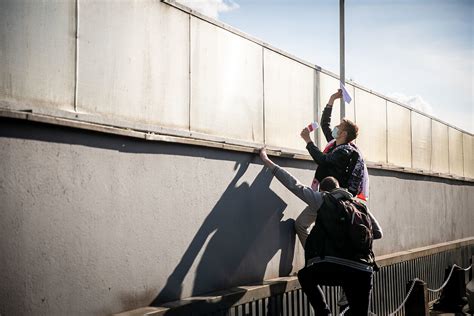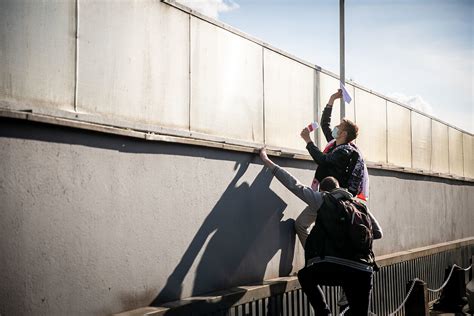
Released Belarusian dissidents sought refuge at the U.S. Embassy in Vilnius, Lithuania, after being freed from Belarusian prisons, marking a significant development in the ongoing crackdown on opposition figures and political activists in Belarus.
VILNIUS, Lithuania – Several cars carrying recently released Belarusian dissidents arrived at the U.S. Embassy in Vilnius on Tuesday, seeking safety and potentially political asylum following their release from Belarusian prisons. This event underscores the continued repression of political dissent in Belarus and the critical role of international diplomacy in providing protection to those persecuted by the Belarusian government. The dissidents’ arrival at the embassy highlights the escalating tensions between Belarus and the West, particularly the United States, over human rights and political freedoms.
The release of these dissidents, while welcomed by international human rights organizations and Western governments, is viewed with cautious optimism, as the Belarusian government, led by President Alexander Lukashenko, has a history of re-arresting and further persecuting those who challenge its authority. The act of seeking refuge at the U.S. Embassy indicates a deep distrust of the Belarusian authorities and a fear of potential retribution despite their release.
“The situation in Belarus remains dire, with ongoing reports of arbitrary arrests, torture, and political persecution,” said a spokesperson for a human rights organization monitoring the situation in Belarus. “The international community must continue to exert pressure on the Lukashenko regime to end these abuses and respect the fundamental rights of its citizens.”
The U.S. Embassy in Vilnius has not yet released an official statement regarding the arrival of the Belarusian dissidents. However, it is widely expected that the embassy will provide assistance and assess their claims for asylum or other forms of protection. The United States has been a vocal critic of the Belarusian government’s human rights record and has imposed sanctions on Belarusian officials implicated in human rights abuses and election fraud.
This latest development adds to the complex geopolitical landscape in Eastern Europe, where the Belarusian government’s close ties with Russia have further strained relations with the West. The ongoing conflict in Ukraine has also heightened tensions in the region, with Belarus serving as a key ally and staging ground for Russian military operations.
Background of Political Repression in Belarus
The political climate in Belarus has been increasingly repressive since the disputed presidential election in August 2020, which saw Alexander Lukashenko claim victory amidst widespread allegations of fraud. The election triggered mass protests across the country, with hundreds of thousands of Belarusians taking to the streets to demand free and fair elections and an end to Lukashenko’s 26-year rule.
In response to the protests, the Belarusian government launched a brutal crackdown on opposition leaders, activists, journalists, and ordinary citizens. Thousands of people have been arrested, detained, and subjected to torture and ill-treatment. Many opposition figures have been forced to flee the country to avoid persecution.
The crackdown has been widely condemned by international organizations and Western governments, who have called for an end to the violence and repression and for the release of political prisoners. The European Union and the United States have imposed sanctions on Belarusian officials and entities in response to the human rights abuses and election fraud.
Despite the international pressure, the Belarusian government has shown no signs of easing its grip on power. Lukashenko has maintained close ties with Russian President Vladimir Putin, who has provided political and economic support to his regime. The Belarusian government has also cracked down on independent media and civil society organizations, further restricting freedom of expression and assembly.
The Role of the U.S. Embassy in Vilnius
The U.S. Embassy in Vilnius has played a significant role in providing support to Belarusian dissidents and promoting human rights in Belarus. Lithuania, as a neighboring country with a shared history and cultural ties, has become a hub for Belarusian exiles and activists. The U.S. Embassy has worked closely with Lithuanian authorities and civil society organizations to provide assistance to those fleeing persecution in Belarus.
The embassy’s consular services provide support to Belarusian citizens seeking visas or asylum in the United States. The embassy also engages in public diplomacy efforts to raise awareness about the human rights situation in Belarus and to promote democratic values.
The decision by the Belarusian dissidents to seek refuge at the U.S. Embassy in Vilnius underscores the importance of the embassy’s role in providing protection and support to those who are persecuted by the Belarusian government. It also highlights the trust that these dissidents place in the United States as a defender of human rights and democracy.
International Reactions and Implications
The arrival of the Belarusian dissidents at the U.S. Embassy in Vilnius has drawn strong reactions from international organizations and Western governments. Many have reiterated their condemnation of the Belarusian government’s human rights record and have called for the immediate and unconditional release of all political prisoners.
“We are deeply concerned by the ongoing repression in Belarus and the continued detention of political prisoners,” said a spokesperson for the U.S. State Department. “We urge the Belarusian government to release all political prisoners immediately and unconditionally and to engage in a genuine dialogue with the opposition.”
The European Union has also condemned the crackdown in Belarus and has imposed sanctions on Belarusian officials and entities. “The European Union stands in solidarity with the people of Belarus and will continue to support their aspirations for democracy and human rights,” said a spokesperson for the European Commission.
The situation in Belarus has significant implications for regional security and stability. The Belarusian government’s close ties with Russia have raised concerns about the potential for further Russian interference in the region. The ongoing conflict in Ukraine has also heightened tensions in Eastern Europe, with Belarus serving as a key ally and staging ground for Russian military operations.
Challenges and Future Prospects
The situation in Belarus remains highly uncertain, with little prospect of a near-term resolution to the political crisis. The Belarusian government has shown no willingness to engage in a genuine dialogue with the opposition or to address the concerns of the international community.
The ongoing repression and the economic consequences of the sanctions have created significant challenges for the Belarusian people. Many Belarusians have been forced to flee the country in search of safety and economic opportunity.
Despite the challenges, there are also reasons for optimism. The Belarusian opposition remains resilient and determined to continue the struggle for democracy and human rights. The international community has shown strong support for the Belarusian people and has vowed to continue to exert pressure on the Lukashenko regime.
The future of Belarus will depend on the ability of the Belarusian people to persevere in their struggle for freedom and democracy, and on the willingness of the international community to continue to support them. The arrival of the Belarusian dissidents at the U.S. Embassy in Vilnius serves as a reminder of the importance of international solidarity and the need to provide protection and support to those who are persecuted by authoritarian regimes.
In-Depth Analysis of the Dissidents’ Release and Subsequent Actions
The release of the Belarusian dissidents, followed by their immediate seeking of refuge at the U.S. Embassy in Vilnius, presents a complex scenario demanding a nuanced understanding. While the release itself might seem like a positive step, the dissidents’ subsequent actions reveal a deeper sense of vulnerability and distrust towards the Belarusian government.
Firstly, the timing of the release raises suspicion. It could be interpreted as a tactical move by the Lukashenko regime to alleviate international pressure, particularly from the U.S. and the EU, who have consistently condemned the political repression and imposed sanctions. By releasing a few high-profile dissidents, the government might aim to project an image of reform and openness, potentially weakening the resolve of international actors to maintain sanctions or pursue further punitive measures.
However, the dissidents’ decision to immediately seek protection at the U.S. Embassy suggests that they do not believe the release to be genuine or sustainable. They likely fear rearrest, further harassment, or even physical harm, despite being officially freed. This fear is not unfounded, given the history of the Lukashenko regime, which has repeatedly violated human rights and disregarded international norms.
Secondly, the choice of the U.S. Embassy as a place of refuge is significant. It indicates a strong belief in the U.S.’s commitment to human rights and its willingness to provide protection to those persecuted by authoritarian regimes. The U.S. has been a vocal critic of the Lukashenko government, imposing sanctions and providing support to Belarusian civil society organizations. Therefore, the dissidents likely view the U.S. Embassy as a safe haven and a potential gateway to asylum or other forms of international protection.
Thirdly, the incident highlights the limitations of international diplomacy in dealing with authoritarian regimes. While sanctions and condemnations can exert pressure on the Lukashenko government, they have not been sufficient to bring about meaningful reforms or end the political repression. The release of the dissidents, followed by their immediate seeking of refuge, demonstrates the regime’s continued disregard for international norms and its willingness to manipulate the situation for its own benefit.
The international community faces a difficult challenge in addressing the situation in Belarus. While maintaining pressure on the Lukashenko government is crucial, it is also important to provide support to the Belarusian people and civil society organizations. This includes providing humanitarian assistance to those who have been displaced or persecuted, supporting independent media and human rights monitoring efforts, and offering asylum and protection to those who have fled the country.
The Geopolitical Context: Belarus Between Russia and the West
The crisis in Belarus is deeply intertwined with the broader geopolitical tensions between Russia and the West. Belarus has traditionally been a close ally of Russia, and the Lukashenko government has relied on Russian political and economic support to maintain its grip on power.
The West, on the other hand, has sought to promote democracy and human rights in Belarus, supporting opposition movements and civil society organizations. However, Western influence in Belarus has been limited, due to the country’s close ties with Russia and the Lukashenko government’s resistance to external pressure.
The conflict in Ukraine has further complicated the situation in Belarus. The Lukashenko government has supported Russia’s actions in Ukraine, allowing Russian troops to use Belarusian territory as a staging ground for the invasion. This has further strained relations between Belarus and the West, and has raised concerns about the potential for Belarus to become more deeply involved in the conflict.
The geopolitical context makes it difficult to find a solution to the crisis in Belarus. Any attempt to promote democracy and human rights in Belarus must take into account the country’s close ties with Russia and the potential for Russian interference. At the same time, it is important to avoid escalating tensions between Russia and the West, which could have dangerous consequences for the entire region.
The Future of the Belarusian Opposition
The Belarusian opposition faces significant challenges in its struggle for democracy and human rights. Many opposition leaders have been arrested or forced to flee the country, and the government has cracked down on independent media and civil society organizations.
Despite these challenges, the Belarusian opposition remains resilient and determined to continue the struggle. Opposition leaders have established networks of support both inside and outside the country, and they are using social media and other online platforms to communicate with their supporters and to organize protests.
The future of the Belarusian opposition will depend on its ability to maintain its unity and to adapt to the changing political landscape. It will also depend on the support it receives from the international community.
Economic Factors Contributing to the Crisis
Beyond the immediate political repression, economic factors have played a significant role in fueling the crisis in Belarus. The Belarusian economy has been struggling for years, due to a combination of factors, including mismanagement, corruption, and dependence on Russia.
The Lukashenko government has maintained a state-controlled economy, which has stifled innovation and entrepreneurship. Corruption has been rampant, diverting resources away from productive investments and undermining public trust. The country’s heavy reliance on Russia for energy and financial support has made it vulnerable to economic pressure from Moscow.
The economic crisis has led to widespread discontent among the Belarusian population, who have seen their living standards decline and their opportunities limited. This discontent has been a major factor in the mass protests that have taken place since the disputed presidential election in 2020.
Addressing the economic challenges facing Belarus is crucial for resolving the political crisis. This requires implementing reforms to promote economic growth, reduce corruption, and diversify the economy. It also requires attracting foreign investment and creating new jobs.
The Impact of Sanctions on the Belarusian Economy and Society
International sanctions imposed on Belarus by the United States, the European Union, and other countries have had a significant impact on the Belarusian economy and society. The sanctions have targeted Belarusian officials and entities implicated in human rights abuses and election fraud, as well as key sectors of the Belarusian economy.
The sanctions have made it more difficult for Belarusian companies to access international markets and to attract foreign investment. They have also led to a decline in trade between Belarus and the West.
The impact of the sanctions on the Belarusian economy has been mixed. On the one hand, the sanctions have put pressure on the Lukashenko government to address the human rights situation and to engage in a genuine dialogue with the opposition. On the other hand, the sanctions have also hurt the Belarusian people, leading to higher prices, job losses, and reduced access to essential goods and services.
The effectiveness of the sanctions in achieving their intended goals is a subject of ongoing debate. Some argue that the sanctions have been too weak and have not done enough to pressure the Lukashenko government. Others argue that the sanctions have been too harsh and have disproportionately harmed the Belarusian people.
The Role of Civil Society in Belarus
Civil society organizations have played a crucial role in promoting democracy and human rights in Belarus. These organizations have worked to monitor human rights abuses, provide legal assistance to victims of repression, and support independent media and education.
The Belarusian government has cracked down on civil society organizations, arresting activists, closing down organizations, and restricting their access to funding. Despite these challenges, civil society organizations continue to operate in Belarus, often working underground or in exile.
The role of civil society is essential for building a democratic and just society in Belarus. These organizations provide a voice for the voiceless, hold the government accountable, and promote civic engagement.
The Perspective of Ordinary Belarusians
The crisis in Belarus has had a profound impact on the lives of ordinary Belarusians. Many Belarusians have been arrested, detained, and subjected to torture and ill-treatment. Others have been forced to flee the country to avoid persecution.
The economic crisis has also made life more difficult for ordinary Belarusians. Many have seen their living standards decline and their opportunities limited.
Despite the challenges, many Belarusians remain hopeful for the future. They believe that one day Belarus will be a democratic and prosperous country, where human rights are respected and the rule of law prevails.
The Long-Term Implications of the Crisis
The crisis in Belarus has long-term implications for the country’s political, economic, and social development. The political repression has created a climate of fear and mistrust, which will make it difficult to build a democratic society. The economic crisis has undermined the country’s long-term economic prospects. The social divisions created by the crisis will take time to heal.
The future of Belarus will depend on the ability of the Belarusian people to overcome these challenges and to build a more just and prosperous society. It will also depend on the support they receive from the international community.
FAQ: Belarusian Dissidents Seek Refuge at U.S. Embassy
1. Why did the Belarusian dissidents seek refuge at the U.S. Embassy in Vilnius after being released from prison?
The dissidents likely sought refuge at the U.S. Embassy due to a deep distrust of the Belarusian government, fearing potential rearrest, harassment, or other forms of persecution despite their release. They view the U.S. Embassy as a safe haven and a potential avenue for seeking asylum or international protection, given the U.S.’s vocal criticism of the Belarusian government’s human rights record.
2. What is the U.S. government’s stance on the situation in Belarus?
The U.S. government has been a vocal critic of the Belarusian government’s human rights record, particularly since the disputed 2020 presidential election. The U.S. has imposed sanctions on Belarusian officials and entities implicated in human rights abuses, election fraud, and undermining democratic processes. The U.S. State Department has consistently urged the Belarusian government to release all political prisoners and engage in a genuine dialogue with the opposition.
3. How has the international community responded to the political repression in Belarus?
The international community, including the European Union and the United States, has largely condemned the Belarusian government’s crackdown on opposition and civil society. These entities have imposed sanctions, issued statements of concern, and supported international investigations into human rights abuses. However, the effectiveness of these measures in bringing about change within Belarus remains a subject of ongoing debate.
4. What are the potential implications of this incident for U.S.-Belarusian relations?
This incident is likely to further strain already tense relations between the U.S. and Belarus. The U.S. is likely to view the dissidents’ actions as evidence of the continued repression in Belarus, potentially leading to increased sanctions or other punitive measures. The Belarusian government, in turn, may accuse the U.S. of interfering in its internal affairs.
5. What options are available to the U.S. Embassy in Vilnius in assisting the Belarusian dissidents?
The U.S. Embassy in Vilnius can provide a range of assistance to the Belarusian dissidents, including:
- Assessing their claims for asylum or other forms of protection.
- Providing temporary shelter and support.
- Facilitating communication with international organizations and human rights groups.
- Advocating for their rights with the Lithuanian government and international community.
- Processing visa applications for those seeking to resettle in the United States.
The specific assistance provided will depend on the individual circumstances of the dissidents and the policies of the U.S. government.









